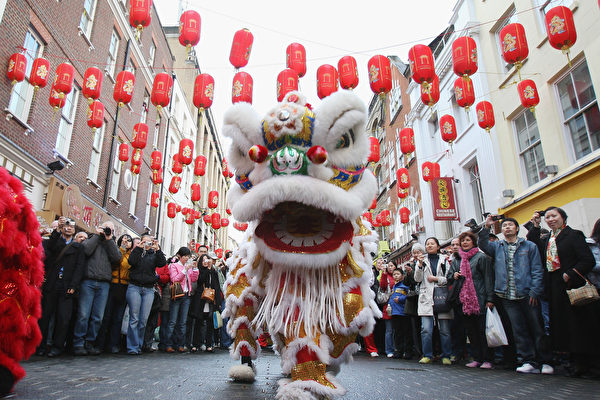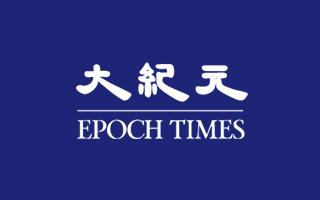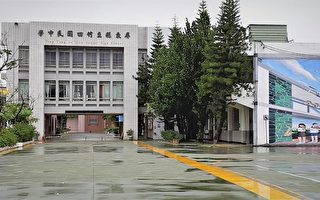【大纪元2019年01月15日讯】Most of the Taiwanese people are from the Han ethnic group and speak Mandarin. We follow cultural customs of our mainland counterparts. While Chinese New Year, or also called the New Year’s Day, is one of the most important events in Chinese communities throughout the world.
The New Year’s Day begins on the first day of the first lunar calendar month. The year of 2019 falls on February 5th. It is the year of the pig, according to Chinese zodiac, or animal sign.
【中译】
台湾人多数来自汉族,说中文(普通话),同样遵循大陆华人的文化习俗。新年,或称过年,可说是全球华人社会最重要的日子。
过年从黄历正月初一开始。2019年则落在2月5日。根据十二生肖,今年是猪年。
If you are interested in this family-reunioned holiday and enjoy everywhere decorated with gold or red color as a symbol of Xǐ Qì Yáng Yáng/喜气洋洋/may happiness and luck full of you.
Follow us to celebrate and get to know what lucky phrases you can say, what must-do’s, and what must-not-do’s especially during this period of time.
【中译】
如果你喜欢家人团聚的日子,并享受处处以金或红色装饰的氛围(象征喜气洋洋)。
那就跟我们一起庆祝,了解新年吉祥话怎么说?什么事一定要做?什么禁忌要避免?
【单字/词解析/背景知识】
● Hàn Zú/汉族/the Han ethnic group
汉族,生活在东亚地区的一个民族,种族上属于东亚蒙古人种,是数个现代国家和地区的主体民族。占中国大陆人口92%,占台湾人口97%,占新加坡人口74%,占马来西亚人口23.4%。汉族在世界各地皆有分布,总人口约为13.9亿,约占世界人口的18.2%,目前是世界上人口最多的民族。汉族通常被认为是上古传说炎帝(或神农氏)与黄帝(或轩辕氏)两个部落的后裔,所以才有“炎黄子孙”的称谓。
● mainland counterparts,名词/ˈmeɪn.lænd/ /ˈkaʊntə(r)ˌpɑː(r)t/大陆人民
解析:mainland,不含周边小岛的大陆本土。counterparts,在不同地方,但有相似处的同胞。
● festival,名词/ˈfestɪv(ə)l/节日(庆)
解析:The Moon Festival is celebrated on the fifteenth day of August based on lunar calendar.(黄历八月十五日庆祝中秋节。)
● community,名词 /kəˈmjuːnəti/社区(团、会)、界
解析:Drug trafficking is a matter of big concern for the entire international community.(贩毒是整个国际社会都相当关注的问题。)
● lunar,形容词 /ˈluːnə(r)/月亮的
解析:Apollo 11 lunar lander safely touched down on the moon.(阿波罗11登陆器,安全地降落在月球上。)
● Shí’ èr Shēng Xiào/十二生肖/Chinese zodiac(animal sign)
解析:in astrology(占星学), any of the twelve symbols that represent parts of the year。西方有12星座,对应东方的12生肖。例句:What is your star sign?(你是什么星座?) What is your animal sign?(你属什么生肖?)
● decorate,动词/ˈdekəreɪt/装饰
解析:Have you decorated your Christmas tree yet?(你的圣诞树装饰,完成了吗?)
● symbol,名词/ˈsɪmb(ə)l/象征
解析:A heart shape is the symbol of love.(心形是爱的象征。)
● phrase,名词 /freɪz/词语
解析:lucky phrases 也可说 lucky words。中文里常用的成语、俗谚(惯用语)、双关语,英文我们可以用:idioms, sayings (proverbs), or puns。
Idioms(成语):通常无法顾名思义,英文例如:It’ll be a cold day in hell.(意指:决不会发生!);中文例如:汗牛充栋(指藏书众多)。
Sayings or proverbs(俗谚或惯用语):普遍为众人所知、所用。英文例如:Practice makes perfect.(熟能生巧);中文例如:天下没有白吃的午餐(No pain, no gain.)。
Puns (双关语):同音、多义的用语,暗指不同意义、趣味横生。英文例如:Where do polar bears vote? The North Poll.(北极熊在哪里投票?北极。)英文的 poll,指的是投票的地方。
● 2019年是猪年(The year of 2019 is the year of the pig.)
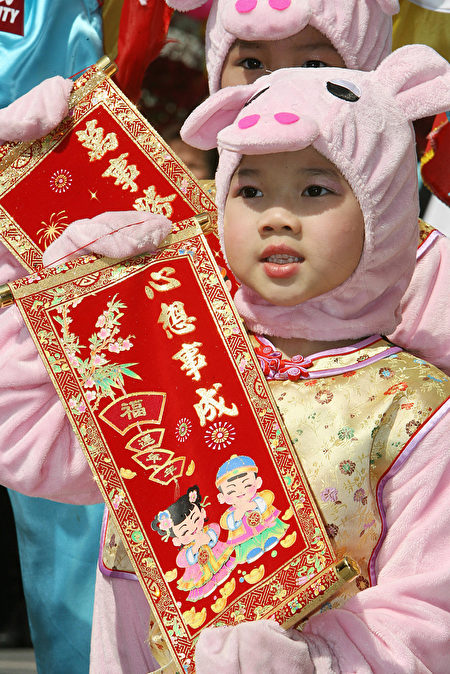
The Pig is the twelfth of all zodiac animals. According to one myth, the Jade Emperor said, let’s race to cross the river, and the place would be decided by the order in which you arrived to the destination. Pig was late because he overslept. When he arrived, he was the last one and could only take the twelfth place.
In Chinese culture, pigs are the symbol of wealth and that is probably the “Piggy Bank” invented and widely used among children.
【中译】
猪,在十二生肖动物里排名第十二。神话故事里,玉皇大帝说,(各位动物)我们来比赛渡河,排名的顺序就由先后抵达终点决定。猪因为睡过头而迟到。当他抵达时,已经是最后一个了,只拿到第十二名。
在中华文化里,猪是财富的象征,这大概也是猪造型“扑满”的出现,且广为孩子使用。
● 生肖属猪的性格(Characters and personalities of the pig)
Pigs might not stand out in a crowd. But they are very realistic. Others may be all talk and no action. Pigs are the opposite.(生肖属猪的人,可能不会出类拔萃。但他们非常实际,多数人可能光说不练;属猪的人则愿意行动。)
Though not wasteful spenders, they will let themselves enjoy life. They love entertainment and will occasionally treat themselves. (他们虽然不至于浪费,但也会享受生活。喜欢娱乐,偶尔也会宠爱自己一下。)
They are a bit materialistic, but this is motivation for them to work hard. Being able to hold solid objects in their hands gives them security.(倾向物质主义,但这也是他们努力工作的动力来源。手中握有实物,会让他们充满安全感。)
They are energetic and are always enthusiastic, even for boring jobs. If given the chance, they will take positions of power and status. (即使工作再无聊,他们也是精力充沛、充满热情。一旦机会出现,他们将会掌握权力和地位。)
【Jí Xiáng Huà/吉祥话/Lucky Phrases】
(1)Xīn Nián Kuài Lè/新年快乐/Happy New Year
Meaning:Wish you happiness in the New Year
(2)Gōng Xǐ Fā Cái/恭喜发财/
Meaning:Hope you make a lot of money
(3)Cái Yuán Gǔn Gǔn/财源滚滚/
Meaning:Money Luck to roll in
(4)Xīn Xiǎng Shì Chéng/心想事成/
Meaning:Have all of your wishes come true
(5)Shēn Tǐ Jiàn Kāng/身体健康/
Meaning:Wish you good health
(6)Wàn Shì Rú Yì/万事如意/
Meaning:May everything you wish go well
(7)Dà Jí Dà Lì/大吉大利/
Meaning:Have great fortune and favor
(8)Zhū Shì Shùn Lì/“猪”(诸)事顺利
Meaning:May every matter you plan go smoothly
(9)Miào Yǔ Rú Zhū/妙语如“猪”(珠)
Meaning:May always speak with witty remarks
【Yī Dìng Yào Zuò/一定要做/Must-do’s】

(1)Putting up decorations
Every street, building, and house where New Year’s Day is celebrated is decorated with red and gold. Red is the main color for the festival, as red is believed to be an auspicious color. Red lanterns hang in streets and red couplets are pasted on doors. Places and buildings are decorated with red New Year pictures depicting images of prosperity.
【中译】(1)Bù Zhì/布置
庆祝过年的每一条街道、建筑物和房屋都以红色和金色布置。红色是过年的主色,象征吉祥。街上处处可见红色灯笼;贴在门上的春联也是红色的。各处建筑更装饰着描绘繁荣景象的红色新年图片。
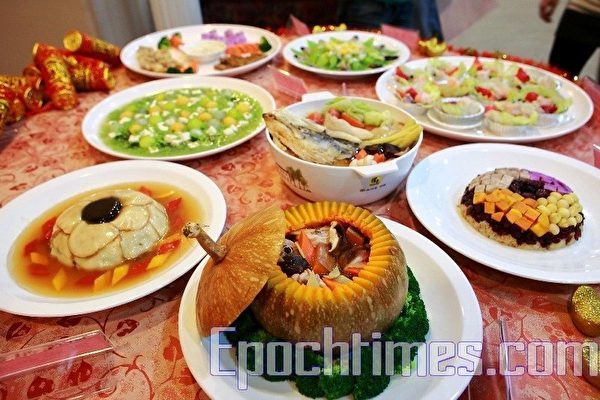
(2)Eating reunion dinner with family on New Year’s Eve
Chinese New Year is a time for families to be together. Wherever they are, people are expected to be home to celebrate the festival with their families. The New Year’s Eve dinner is called ‘reunion dinner’, and is believed to be the most important meal of the year.
【中译】(2)Chī Tuán Yuán Fàn(吃团圆饭)/除夕与家人一起吃团圆饭
中国新年是家人团聚的时光。无论身在何处,大家都希望回家与家人一起庆祝这个节日。除夕夜晚餐,称为“团圆饭”,是一年中最重要的一餐。
(3)Firecrackers and fireworks
In traditional Chinese culture, firecrackers were originally used to scare away evil spirits. Today, lighting firecrackers and fireworks is a major activity to celebrate the coming of the New Year, and also a way to enhance the festive atmosphere.
【中译】(3)Fàng Biān Pào(放鞭炮)/炮竹和烟火
在传统中华文化里,炮竹最初是用来吓走邪灵(年兽)。现今,燃放炮竹和施放烟火,成为庆祝新年到来的主要活动,也是增添过年气氛的一种方式。
(4)Giving red envelopes
At Christmas in the West, people exchange gifts to express care for each other, while, during the New Year’s Day, the most common New Year gifts are red envelopes. Red envelopes have money in, and are believed to bring good luck. They are given to children or those younger than you in the family. Employers often give red envelopes to employees on the first work day right after holidays.
【中译】(4)Sòng Hóng Bāo/送红包
西方的圣诞节,人们交换礼物,表达对彼此的关怀;而过年最常见的新年礼物是红包。红包里放钱,据说会带来好运。红包通常给小孩和家族中较年轻的成员。通常雇主会在上班的第一天给员工红包。
【Jìn Jì/禁忌/Taboos】
(1)Don’t sweep or take out garbage
The act of sweeping on this day is associated with sweeping wealth away. Taking out garbage symbolizes dumping out the good luck or good fortune from the house. Normally, it has to wait until the fifth day of the New Year to clean up the garbage.
【中译】(1)Bù Sǎo Dì(不扫地)/不扫地、不倒垃圾
扫地,意谓着扫走财富。倒垃圾,可能把家里的好运跟财富都倒光光。通常要等到初五才可以清运垃圾。
(2)Don’t say bad words
Don’t use words with negative meanings. Stay away from terms with negative meaning relating to death, sickness, pain, ghosts, poverty, and especially the number four.
【中译】(2)Bù Shuō Zāng Huà/不说脏话
不说有负面含义的话。不说跟死亡、疾病、痛苦、鬼魂、贫穷,以及数字4的话。
(3)Don’t break anything
Breaking things, like bowls or plates, on the New Year’s day may result in losses or family rifts in the future. But if you do, the remedy is to say 岁岁平安 (Suìsuìpíng’ān). The first character sounds like the sound to “break” (碎), but in this case it is replaced with a homonym that means “age” (岁), and said twice means to live a long life and adds the words “peace” and “safety” (平安) at the end.
【中译】(3)Bù Dǎ Pò Dōng Xī/不打破东西
在新年的第一天,打破像碗或盘子的东西,可能会导致损失或家庭失和。但如果真的不小心打破了东西,补救措施就是说岁岁平安(Suìsuìpíng’ān)。第一个字听起来像是“破碎”(碎)的声音,但在这种情况下,它被替换为同义词,意思是“年龄”(岁),并说两次意味着过着漫长的生活,并添加“和平”字样,最后是“安全”(平安)。
(4)Don’t use sharp objects
Avoid using knives, scissors, and needles. It is said that the use of sharp, bladed objects during this festival will cut one’s good fortune and wealth.
【中译】(4)Bù Yòng Jiān Ruì Wù/不用尖锐物
避免用刀子、剪刀和针头。据说,过年期间若用锋利的物品,将减掉好运和财富。
(5)Don’t have congee, or meat for breakfast
In the old days only the poor had to eat things like congee(Chinese porridge) for breakfast on New Year’s Day, so eating it suggests poverty. Instead, you should eat cooked rice to invite wealth to the family for the whole year. The morning of New Year’s day is also a time when all the gods are out and about, so out of respect, Chinese people have a vegetarian breakfast and do not put meat or fish on the table.
【中译】(5)Zǎo Cān Chī Sù(早餐吃素)/早餐不吃粥或肉
很早以前,只有穷人在新年第一天吃早餐时,必须吃粥,所以吃粥代表贫穷。吃米饭,可以为家人带来一整年财富。新年的第一天早晨,也是众神都出来走走的时刻,出于尊重,多数人早餐吃素,不吃肉或鱼类等食物。
(6)Don’t Take Medicine
Old people say, if you take medicine on New Year’s Day, you’ll be sick all year, including using preventive cures. Even the very ill should avoid taking medicine.
【中译】(6)Bù Chī Yào/不吃药
老一辈的人说,如果在新年第一天吃药,你可能整年都会生病,也不吃补药或维他命。即使病的很严重,这天也应避免吃药。
Last, say some “Jí Xiáng Huà” to people around you. Wish everybody “Xīn Nián Kuài Lè,” “Jí Xiáng Rú Yì,” and “Zhū Nián Xíng Dà Yùn.”
最后,跟你周遭的人说句吉祥话吧!祝大家新年快乐、吉祥如意、猪年行大运。#
责任编辑:亦洁


